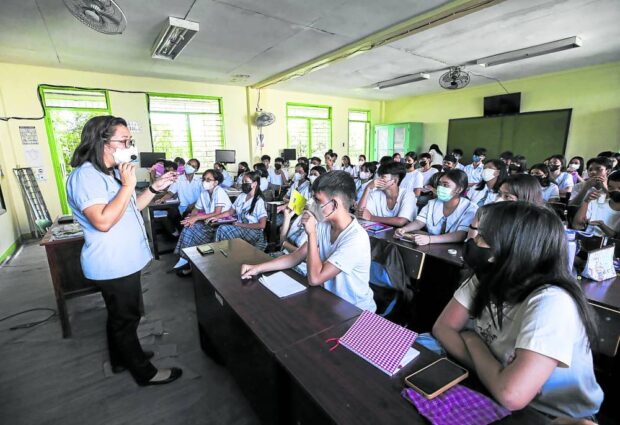ACT worried about some changes in K-12 subjects

CLASS DISCUSSION | A teacher holds an in-person class for students of Navotas National High School in this photo taken in November 2022. The Department of Education is reviewing its K-12 curriculum as it aims to train more job-ready graduates. (File photo by LYN RILLON / Philippine Daily Inquirer)
MANILA, Philippines — The Alliance of Concerned Teachers (ACT) on Monday expressed alarm over the draft K-12 (Kindergarten to Grade 12) curriculum being proposed by the Department of Education (DepEd), which would merge social studies with music, arts, physical education, and health (Mapeh).
In a statement, ACT said that combining the two subjects would reduce the teaching time for a diverse set of subject areas and could potentially affect a student’s development of nationalism, cultural identity, and critical thinking in the early grade levels.
“Giving ample time to teaching social studies and Mapeh should not be seen as a hindrance, but as additional areas that can help develop reading, writing and arithmetic skills,” ACT chair Vladimer Quetua said.
In a Viber message to the Inquirer, DepEd spokesperson Michael Poa said that all comments on the proposed revised K-12 curriculum were being collated for submission to the department’s review team.
DepEd, which conducted last year a review of the current curriculum with the aim of producing more job-ready graduates, said last week that one of the proposed revisions was the introduction of Sibika, Kultura, Kasaysayan at Kagalingang Pangkatawan or Sikap as a new learning area for Kindergarten to Grade 3.
Article continues after this advertisement“This strategic interface of Araling Panlipunan (AP) and Mapeh is in response to the aspiration of the department to focus on foundational literacy in the first key stage (K to Grade 3),” it said in its overall draft or “general shaping papers” for the proposed curriculum.
Article continues after this advertisementDepEd justified the integration, saying that AP and Mapeh were multidisciplinary subjects that “are responsible [for] building a strong foundation for learners, igniting their nationalistic pride and fervor as a Filipino.”
Aside from the introduction of Sikap, another main feature of the revised curriculum was the “focus on big ideas” in response to DepEd’s study which showed that the overcrowded and congested curriculum prevented learners from fully grasping and understanding different concepts.
Adverse effect
ACT said it supported the initiative to decongest the curriculum but said that the proposed changes could possibly weaken the “ingraining of nationalism” in Kindergarten to Grade 3 students.
“DepEd’s proposed revisions to the K-12 curriculum seem to veer education further away from addressing the learning crisis and correcting the problems of the original K-12 curriculum, which have long diluted the inculcation of nationalism with the abolition of the Philippine History subject in junior high school, and watering down of the contents of Araling Panlipunan and Filipino subjects,” Quetua said.
The group also observed that the revised curriculum abolished the “mother tongue” as a subject and introduced teaching English much earlier, specifically the first quarter of Grade 1 from the current third quarter. According to Quetua, teaching the mother tongue as a subject is essential in developing literacy skills as students can learn to read and write using the language they know best.
“Mother tongue also enhances the awareness and appreciation of learners of their cultural identity, and preserves and nurtures our own culture,” he said.
At the same time, he criticized the proposal to introduce the English language at an earlier time, saying it would “mess up” the logical transitory framework of the mother tongue as the first language in learning, Filipino as the second language and English as the third.
“The real agenda behind this is not really for our learners to have a mastery of the vital lessons that they have to learn, but to make them marketable to foreign employers,” Quetua said.
ACT suggested that to help students master foundational literacy skills, the K-12 curriculum should be designed to prioritize the “must-have” competencies.
“Mother tongue should continue to be taught as a subject and the DepEd should rectify its errors in the problematic implementation of the mother tongue program,” Quetua said, adding that all subject areas must be designed to incorporate the development of literacy skills.
He added that subjects that teach nationalism and promote national identity and culture must not be sacrificed to favor the English language.
“Instead, Philippine History as a dedicated subject in high school should be restored, and the contents of Araling Panlipunan and Filipino subjects should be strengthened,” Quetua said.
Good opportunity
But for Carmie Sarmiento, a Grade 2 teacher from Quezon City, merging social studies with Mapeh would be a “good opportunity” to introduce different subjects under one learning area.
As a homeroom class adviser, Sarmiento is responsible for teaching all subjects to her class.“We need to integrate to maximize the allotted time for learning,” she said in a phone interview, adding that nationalism and patriotism could still be instilled in students through Sikap.
“The concept and important details [of the learning area] would still be there. It just depends upon the approach of the teacher on how she or he handles that particular integrated subject to ensure that it will not lose the essence of nationalism or patriotism,” Sarmiento pointed out.
She cited a strategy like using a folk song to teach social studies. “It’s like Mapeh integrated with AP. That’s how we will do it now,” she said.